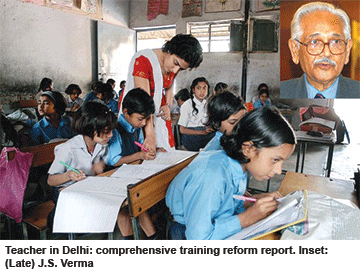 EVEN IF BELATEDLY, the decks have been cleared and the stage is set for implementation of the recommendations of the Supreme Court-appointed Justice J.S. Verma Commission for improving the teacher education system countrywide with a National Regulator of Teacher Education and National Council for Teacher Education (NCTE) preparing to regulate and supervise newly structured teacher education (training) programmes being launched next year (2015). Six study programmes devised by NCTE have been approved and will be offered by several teacher education institutes (TEIs) at the start of the academic year 2015 and by others subsequently.
EVEN IF BELATEDLY, the decks have been cleared and the stage is set for implementation of the recommendations of the Supreme Court-appointed Justice J.S. Verma Commission for improving the teacher education system countrywide with a National Regulator of Teacher Education and National Council for Teacher Education (NCTE) preparing to regulate and supervise newly structured teacher education (training) programmes being launched next year (2015). Six study programmes devised by NCTE have been approved and will be offered by several teacher education institutes (TEIs) at the start of the academic year 2015 and by others subsequently.
The Verma Commission was appointed to investigate teacher education after the NCTE’s Bhopal-based western regional committee (WRC) granted recognition to 291 diploma in education (D.Ed) institutions in Maharashtra in 2008. A public interest litigation was filed against the WRC’s order before the Nagpur bench of the Bombay high court. On January 7, 2009, the high court bench quashed the WRC order on the ground that the grant of recognition to the 291 D.Ed institutions was in breach of an HRD ministry directive requiring WRC to refer the applications of these institutions to NCTE headquarters in Delhi. The ministry’s directive, issued under s.29 of the NCTE Act, was a response to the Maharashtra government’s request to the Union government not to licence any new B.Ed/D.Ed institutions in the state, because supply of trained elementary teachers was already far in excess of demand.
Following the high court’s order, several WRC recognised colleges filed special leave petitions in the Supreme Court in appeal against the high court order. On May 13, 2011, the Supreme Court appointed an eight-member commission under the chairmanship of former Chief Justice J.S. Verma, to examine the entire gamut of issues which have a bearing on improving the quality of teacher education as well as improving the regulatory functions of NCTE.
The Verma Committee’s report titled Vision of Quality Teacher Edu-cation In India, Quality & Regulatory Perspective was submitted to the Union HRD ministry in August 2012. In a comprehensive report, the Verma Commission made 30 recommendations covering six areas of teacher education — quality of pre-service teacher education (“around 90 percent of pre-service TEIs are in the non-government sector”); quality of in-service teacher education; teacher performance and audit; strengthening the regulatory functions of NCTE; general recommendations and recommendations in respect of 300 institutions inspected by the commission in Maharashtra.
The recommendations of this first-of-its-type commission were accepted in toto by the HRD ministry and CABE (Central Advisory Board of Education). In October 2012, its implementation was made mandatory by the Supreme Court.
“The Verma Commission has prepared a comprehensive and excellent report characterised by transparency, engagement and constructivism. We are enthused by the report and will engage in handholding, orientation, processing, monitoring, accreditation and inspections of teacher education institutes under the supervision of the Supreme Court,” vows Prof. Santosh Panda, chairman, NCTE.
Justice J.S. Verma passed away on April 22 last year after serving as a distinguished judge of the Supreme Court for almost a decade including a year as chief justice, and as chairman of the National Human Rights Commission (1999-2003). Subsequently he chaired several commissions including the committee which recommended amendment to the criminal law after the Nirbhaya Delhi gang-rape of 2012. But if implemented in letter and spirit, the recommendations of the J.S. Verma Commission to reform and regulate teacher education may prove to be his most valuable legacy.
Autar Nehru (Delhi)